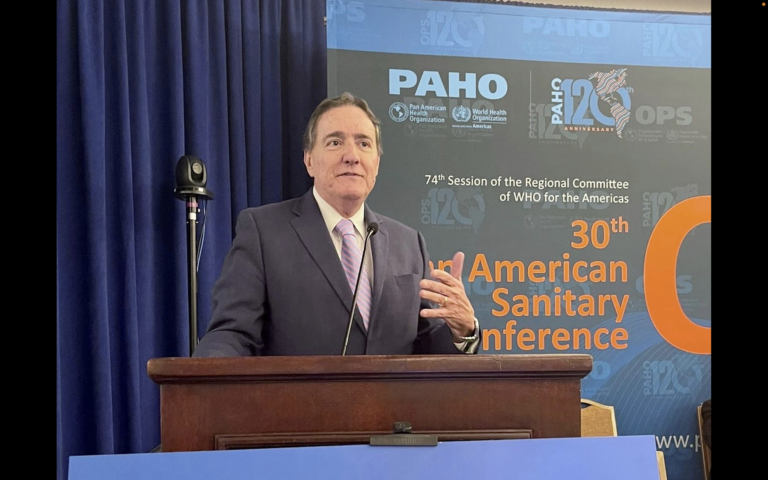If the Americas is to reverse the impact of the COVID-19 pandemic, countries must urgently develop and implement primary health care-based systems that consider the changing epidemiological contexts and population needs of the 21st Century, Dr. Jarbas Barbosa, Director of the Pan American Health Organization (PAHO), said on Thursday.
“We have just been subjected to one of the most devastating events in global public health in the last century. The COVID-19 pandemic had a profound impact on health and socioeconomic development worldwide and resulted in tremendous loss of life in the Region of the Americas,” he said during his remarks at the Primary Care International Conference in Washington D.C.
“I cannot think of a better moment for us to take collective action on this issue.”
During his intervention, Dr. Barbosa highlighted the issues the Region has faced since recognizing primary health care as the principal strategy to address health challenges in the 1978 Alma-Ata Declaration. These include decades of lack of prioritization in health policy, insufficient allocation of resources in communities, and the development of hospital-centric models of care. All of this “contributed to the concentration of healthcare far from the communities and people who needed it most.”
“Our health systems were simply not prepared for the pandemic,” Dr. Barbosa said.
The PAHO Director underscored that primary health care is key to recovering from the pandemic, preparing for future health emergencies and reversing pandemic trends in maternal and child mortality rates, increasing vaccination coverage, accelerating the elimination of communicable diseases such as HIV, TB, and malaria, and expanding access to health services for the control and prevention of non-communicable chronic diseases and mental health.
It is crucial that countries also prioritize a ‘localized approach’ to primary health care, “developing models of care adapted to the local health conditions and local context to reach the most vulnerable populations and address health disparities.”
Health does not start in hospitals or clinics,” added Dr Tedros Adhanom Ghebreyesus, Director-General of the World Health Organization, “but in homes, schools, streets, and workplaces. “As the eyes and ears of the health system, strong primary health care has a vital dual function, in helping to protect communities against both pandemics and everyday health threats.”
“We must continue to exchange experiences and learn from global and regional best practices in primary health care,” Dr. Barbosa said. “Our world today is more interconnected than ever. The spread of COVID-19 and the existential threat of climate change underscore how health disasters do not have borders.”
To accelerate action, Dr. Barbosa urged decision-makers to “Invest, Innovate and Implement.”
While this includes investing the recommended minimum of 6% of Gross Domestic Product in health with a focus on allocating resources to the first level of care, countries must also ensure that funding reaches the populations that need it the most, the PAHO Director highlighted.
Countries must also find “innovative ways to ensure the right to health for all,” not only through technology and digital health but by rethinking models of care, innovations in governance, and intersectoral collaboration with multilateral and bilateral partners.
Finally, Dr. Barbosa called for action. “We must go beyond political declarations and aspirational statements and translate theory into practice.”
Together, we can build resilient health systems that protect, promote, and guarantee the right to health. By investing, innovating, and implementing, we can learn from history, overcome past challenges, accelerate health gains, and create a happier future for all.”
The Primary Care International Conference, which took place at the National Academy of Sciences of the United States, from 19-20 July, brought together high-level health care experts from government, civil society, and academia to discuss the ‘Essential role of Primary Health Care for Health Security and Securing Health”.










